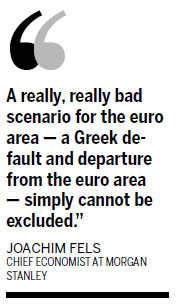Greek leaders reach deal on austerity measures
Updated: 2012-02-07 07:58
(China Daily)
|
|||||||||||
|
 Greek Prime Minister Lucas Papademos (second right) meets with the leaders of other political parties. Chiefs of the three parties supporting Papademos' government agreed on Sunday to make additional budget cuts this year equal to 1.5 percent of GDP. [Kostas Tsironis / Bloomberg] |

Budget cuts hinge on balancing demands of citizens and troika
ATHENS - Greek Prime Minister Lucas Papademos struck a tentative deal with political parties on austerity measures demanded by international creditors as European leaders maintained pressure to complete terms for a 130-billion-euro ($171 billion) rescue package.
Chiefs of the three parties supporting Papademos' interim government agreed in a five-hour meeting on Sunday to make additional reductions this year equal to 1.5 percent of GDP, according to an e-mailed statement from the premier's office in Athens.
The leaders were scheduled to meet again on Monday to work on the details of an agreement after setting a framework for bank recapitalization, ensuring the viability of pension funds and measures to reduce wage and non-wage costs to boost competitiveness.
With the country's stability at stake, the accord marked a step forward as Athens played host to parallel negotiations over the weekend to secure the domestic consensus needed to win a second bailout while persuading Greece's private creditors to accept bigger writedowns on their debt holdings.
This week, "Greece will be left, right and center, taking it right down to the wire," said Erik Nielsen, chief global economist at UniCredit SpA in London.
'Make or break'
Eurozone finance chiefs told Greek Finance Minister Evangelos Venizelos in a conference call on Saturday that an increase in the bailout package wasn't forthcoming, underscoring their frustration at a lack of progress on fixing the economy.
The effort to keep Greece from tumbling into default presents what Deutsche Bank AG Chief Executive Officer Josef Ackermann called a "make or break" moment.
Papademos was to meet the three party leaders on Monday to hammer out details of the measures. Antonis Samaras, the head of the second-biggest party, New Democracy, indicated he would oppose some measures that the so-called troika of international creditors have put forward.
"They are asking us for greater recession, which the country can't take," Samaras said as he left the meeting with Papademos. "I will fight to avoid that."
Greece's efforts to win a second bailout from the so-called troika - the European Commission, the European Central Bank (ECB) and the International Monetary Fund (IMF) - have hung in the balance in recent days as negotiations in Athens failed to clinch an agreement. Venizelos said on Saturday that the talks were "on razor's edge".
Bond redemption
Facing a 14.5-billion-euro bond payment on March 20 and general elections as soon as April, Papademos must heed international demands for greater austerity to complete the talks on a second aid package in time.
Open questions involve how much more aid Greece needs, how much more austerity is required and how to involve the ECB in the private-sector creditor debt swap.
"If we determine that it's all going wrong in Greece, then there won't be a new program - and that means in March you'll have a declaration of bankruptcy," Luxembourg's Jean-Claude Juncker, who chairs euro finance meetings, told Der Spiegel magazine in an interview published on Sunday.
The rescue blueprint includes a loss of more than 70 percent for bondholders in a voluntary debt exchange and loans that will probably exceed the 130 billion euros now on the table. A formal offer for the debt swap must be made by Feb 13 to allow all procedures to be completed before the March 20 bond comes due.
"One thing is clear: The Greek drama continues to unfold," Joachim Fels, chief economist at Morgan Stanley wrote in a note on Sunday. "A really, really bad scenario for the euro area - a Greek default and departure from the euro area - simply cannot be excluded."
Bloomberg News
Today's Top News
President Xi confident in recovery from quake
H7N9 update: 104 cases, 21 deaths
Telecom workers restore links
Coal mine blast kills 18 in Jilin
Intl scholarship puts China on the map
More bird flu patients discharged
Gold loses sheen, but still a safe bet
US 'turns blind eye to human rights'
Hot Topics
Lunar probe , China growth forecasts, Emission rules get tougher, China seen through 'colored lens', International board,
Editor's Picks

|

|

|

|

|

|





